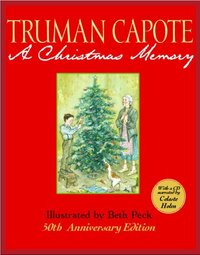You need to sign in or sign up before continuing.
Take a photo of a barcode or cover
Truman Capote is a national treasure. I loved these short, bittersweet memories from his Christmases as a child in Depression-era, rural Alabama. It reminded me that I need to go and read all of his works.
When I finally—after years of meaning to read it—ordered Truman Capote’s A Christmas Memory from eBay, I did not expect what I got. Full disclosure: I have not read Capote, ever. I have meant to, of course, but have never gotten around to it. Yet. My impression, however, is true crime with a literary swagger. A Christmas Memory is a short story that has been turned into a children’s picture book, several times. I did know the story was short, but not short enough to be a children’s picture book. And I wasn’t even clear that what I bought was a picture book. But lo and behold, there it is on my dresser: a Truman Capote Christmas picture book.
I also knew that this particular story was a Christmas classic. Like Skipping Christmas (see previous review) it graces the top of all the Christmas books lists, with no regard for its brevity or intended audience. Is it even meant for children? It is based on Capote’s own quirky, 1930s childhood, a true story, imbibed with something of a Christmas spirit: a bittersweet nod to familial love and down-home traditions. It is about a child and an old woman. When illustrated, it is clearly meant for children. As a short story, it can appeal to a very wide range of readers. It has strains of more serious things: aging, death, disability, drunkenness, abandonment, poverty… but this makes the whole thing sound much more serious than it comes across. The story itself is light and sweet and except for the part where the older relative procures alcohol during the prohibition and gets a little drunk with the kid, it wouldn’t need much explanation.
The story in a nutshell: a boy (who was Capote) lives with a houseful of elder cousins after his parents have abandoned him. All of the cousins are somber and strict except for one. She appears to be developmentally delayed and looked down upon, but she is the boy’s best friend and confidant—her and the family dog. They have a few Christmas adventures together, all part of their usual traditions: collecting walnuts, making and sending fruit cakes, exchanging gifts, flying kites… though between the two of them and their combined childishness, nothing is ever done without an eyebrow-raising flourish. They have a moving, if unconventional, friendship that is the center of this story, which is a “memory” of a young man, walking across a college campus shortly after his friend’s death.
I guess I can see why there are fans of A Christmas Memory, but I can’t say it was a favorite of mine. It’s going into the small pile of Christmas books that I keep with the decorations and pull out every year, and I would recommend it. Perhaps, as usual, I was expecting too much. I think I was expecting better writing. But the writing is solid, straight-forward, and, well, I have to keep coming back to the word “sweet” because that is what this story is. Sweet and a little sad. Old fashioned and perspective-giving. And despite its allusions to church and heaven, it exists outside religion as a Christmas story: it’s purely secular, at heart.
There was a made-for-TV movie aired first in 1966 that was narrated by Truman Capote and won several accolades. A 1997 Hallmark movie did fairly well but is not supposed to be as good as the original. The story has been adapted many other times, notably read by Capote for NPR and as a 2010 Broadway musical. I have not seen or listened to any of them, and neither of the movies are available on my streaming services (unless I buy the 1997 version).
***REVIEW WRITTEN FOR THE STARVING ARTIST BLOG***
I also knew that this particular story was a Christmas classic. Like Skipping Christmas (see previous review) it graces the top of all the Christmas books lists, with no regard for its brevity or intended audience. Is it even meant for children? It is based on Capote’s own quirky, 1930s childhood, a true story, imbibed with something of a Christmas spirit: a bittersweet nod to familial love and down-home traditions. It is about a child and an old woman. When illustrated, it is clearly meant for children. As a short story, it can appeal to a very wide range of readers. It has strains of more serious things: aging, death, disability, drunkenness, abandonment, poverty… but this makes the whole thing sound much more serious than it comes across. The story itself is light and sweet and except for the part where the older relative procures alcohol during the prohibition and gets a little drunk with the kid, it wouldn’t need much explanation.
The story in a nutshell: a boy (who was Capote) lives with a houseful of elder cousins after his parents have abandoned him. All of the cousins are somber and strict except for one. She appears to be developmentally delayed and looked down upon, but she is the boy’s best friend and confidant—her and the family dog. They have a few Christmas adventures together, all part of their usual traditions: collecting walnuts, making and sending fruit cakes, exchanging gifts, flying kites… though between the two of them and their combined childishness, nothing is ever done without an eyebrow-raising flourish. They have a moving, if unconventional, friendship that is the center of this story, which is a “memory” of a young man, walking across a college campus shortly after his friend’s death.
I guess I can see why there are fans of A Christmas Memory, but I can’t say it was a favorite of mine. It’s going into the small pile of Christmas books that I keep with the decorations and pull out every year, and I would recommend it. Perhaps, as usual, I was expecting too much. I think I was expecting better writing. But the writing is solid, straight-forward, and, well, I have to keep coming back to the word “sweet” because that is what this story is. Sweet and a little sad. Old fashioned and perspective-giving. And despite its allusions to church and heaven, it exists outside religion as a Christmas story: it’s purely secular, at heart.
There was a made-for-TV movie aired first in 1966 that was narrated by Truman Capote and won several accolades. A 1997 Hallmark movie did fairly well but is not supposed to be as good as the original. The story has been adapted many other times, notably read by Capote for NPR and as a 2010 Broadway musical. I have not seen or listened to any of them, and neither of the movies are available on my streaming services (unless I buy the 1997 version).
***REVIEW WRITTEN FOR THE STARVING ARTIST BLOG***
emotional
reflective
fast-paced
Plot or Character Driven:
Character
Strong character development:
No
Loveable characters:
Yes
Diverse cast of characters:
No
emotional
mysterious
reflective
sad
fast-paced
Plot or Character Driven:
Plot
Strong character development:
Complicated
Loveable characters:
Yes
Diverse cast of characters:
Yes
Flaws of characters a main focus:
Yes
Three poignant autobiographical stories about love and friendship. Sweet memories, tinged with sadness.
Three short stories. A Christmas Memory was a gem, 5 stars. One Christmas 3 stars. The Thanksgiving Visitor 4 stars. I can see rereading this every Holiday season.
I loved the writing style, going to find more from Mr. Capote.
I loved the writing style, going to find more from Mr. Capote.
Não tenho o hábito de fazer releituras. Seja porque a memória do primeiro contacto com a história ainda perdura ou porque a lista de títulos a ler é infinita e a curiosidade não permite perder tempo.
Ainda assim, estranho que seja - e é - decidi recuperar dois contos de Natal de Truman Capote. Já lá vão uns anos, pensei, não deve fazer mal. Não fez. Mas agudizou a experiência da leitura.
Não é preciso dizer muito - nem é preciso dizer nada - deste pequeno conto a menos que deseje arruinar experiências de leitura que têm o potencial de ser tão boas ou melhores do que a minha.
Os contos são do pouco que conheço da obra de Capote, mas esta releitura aguçou a vontade de ir mais longe nesta procura de conhecer mais e mais do seu talento.
Fica, para minha própria referência, e para quem tiver interesse, a passagem mais memorável deste conto (na minha perspectiva, claro).
"You know what I've always thought?" she asks in a tone of discovery and not smiling at me but a point beyond. "I've always thought a body would have to be sick and dying before they saw the Lord. And I imagined that when he came it would be like booking at the Baptist window: pretty as colored glass with the sun pouring through, such a shine you don't know it's getting dark. And it's been a comfort: to think of that shine taking away all the spooky feeling. But I'll wager it never happens. I'll wager at the very end a body realizes the Lord has already shown Himself. That things as they are" her hand circles in a gesture that gathers clouds and kites and grass and Queenie pawing earth over her bone-"just what they've always seen, was seeing Him. As for me, I could leave the world with today in my eyes."
Ainda assim, estranho que seja - e é - decidi recuperar dois contos de Natal de Truman Capote. Já lá vão uns anos, pensei, não deve fazer mal. Não fez. Mas agudizou a experiência da leitura.
Não é preciso dizer muito - nem é preciso dizer nada - deste pequeno conto a menos que deseje arruinar experiências de leitura que têm o potencial de ser tão boas ou melhores do que a minha.
Os contos são do pouco que conheço da obra de Capote, mas esta releitura aguçou a vontade de ir mais longe nesta procura de conhecer mais e mais do seu talento.
Fica, para minha própria referência, e para quem tiver interesse, a passagem mais memorável deste conto (na minha perspectiva, claro).
"You know what I've always thought?" she asks in a tone of discovery and not smiling at me but a point beyond. "I've always thought a body would have to be sick and dying before they saw the Lord. And I imagined that when he came it would be like booking at the Baptist window: pretty as colored glass with the sun pouring through, such a shine you don't know it's getting dark. And it's been a comfort: to think of that shine taking away all the spooky feeling. But I'll wager it never happens. I'll wager at the very end a body realizes the Lord has already shown Himself. That things as they are" her hand circles in a gesture that gathers clouds and kites and grass and Queenie pawing earth over her bone-"just what they've always seen, was seeing Him. As for me, I could leave the world with today in my eyes."
Quando o tempo escasseia, os contos são uma boa aposta. Mas encontrar bons contistas não é fácil! Normalmente, a saída mais simples é a de admitir: não sou leitora de contos. Mas esta desculpa é um engano comum entre leitores.
Truman Capote aqui está para nos provar isso mesmo.
E é imprescindível salientar a sua subtileza e a capacidade que tem para tratar a autobiografia e o retrato com uma ferocidade e uma melancolia brilhantes.
E se o tom de A Christmas Memory é todo ele pensado para levar o leitor ao cúmulo da saudade e da recordação dos tempos felizes da infância, One Christmas usa de um tom completamente diferente - transições de narrador (criança/adulto), mudanças de ambiente, elementos e reflexões de teor mais negro (como a confissão de Buddy: "I tried not to listen, because by telling me my birth had destroyed her, she was destroying me"), e a sujeição à incerteza resultam numa leitura muito diferente entre os dois contos.
E se do anterior me recordava muito bem, este tinha-me passado de memória.
Estou decididamente interessada em ler mais de Capote.
Truman Capote aqui está para nos provar isso mesmo.
E é imprescindível salientar a sua subtileza e a capacidade que tem para tratar a autobiografia e o retrato com uma ferocidade e uma melancolia brilhantes.
E se o tom de A Christmas Memory é todo ele pensado para levar o leitor ao cúmulo da saudade e da recordação dos tempos felizes da infância, One Christmas usa de um tom completamente diferente - transições de narrador (criança/adulto), mudanças de ambiente, elementos e reflexões de teor mais negro (como a confissão de Buddy: "I tried not to listen, because by telling me my birth had destroyed her, she was destroying me"), e a sujeição à incerteza resultam numa leitura muito diferente entre os dois contos.
E se do anterior me recordava muito bem, este tinha-me passado de memória.
Estou decididamente interessada em ler mais de Capote.






